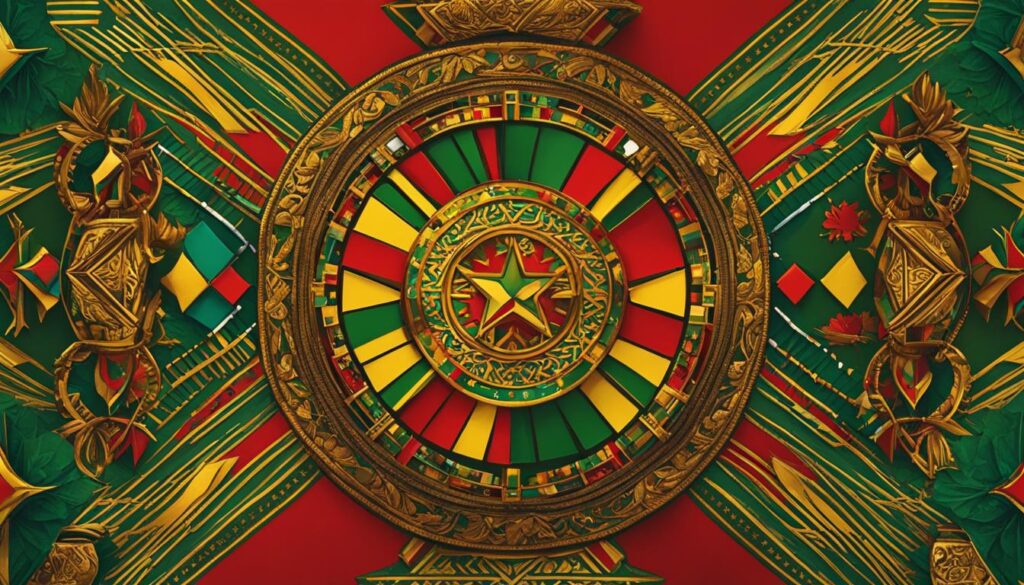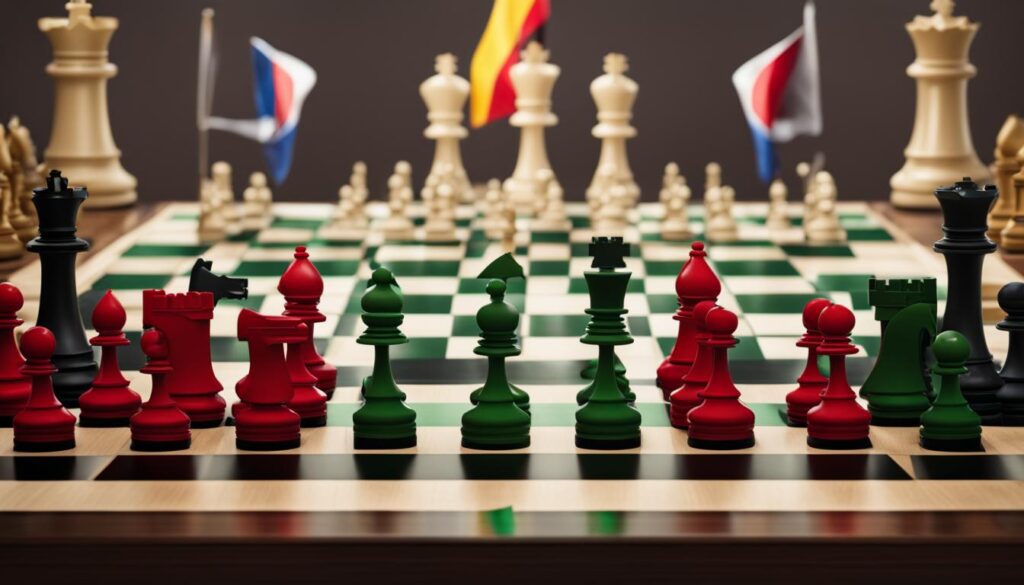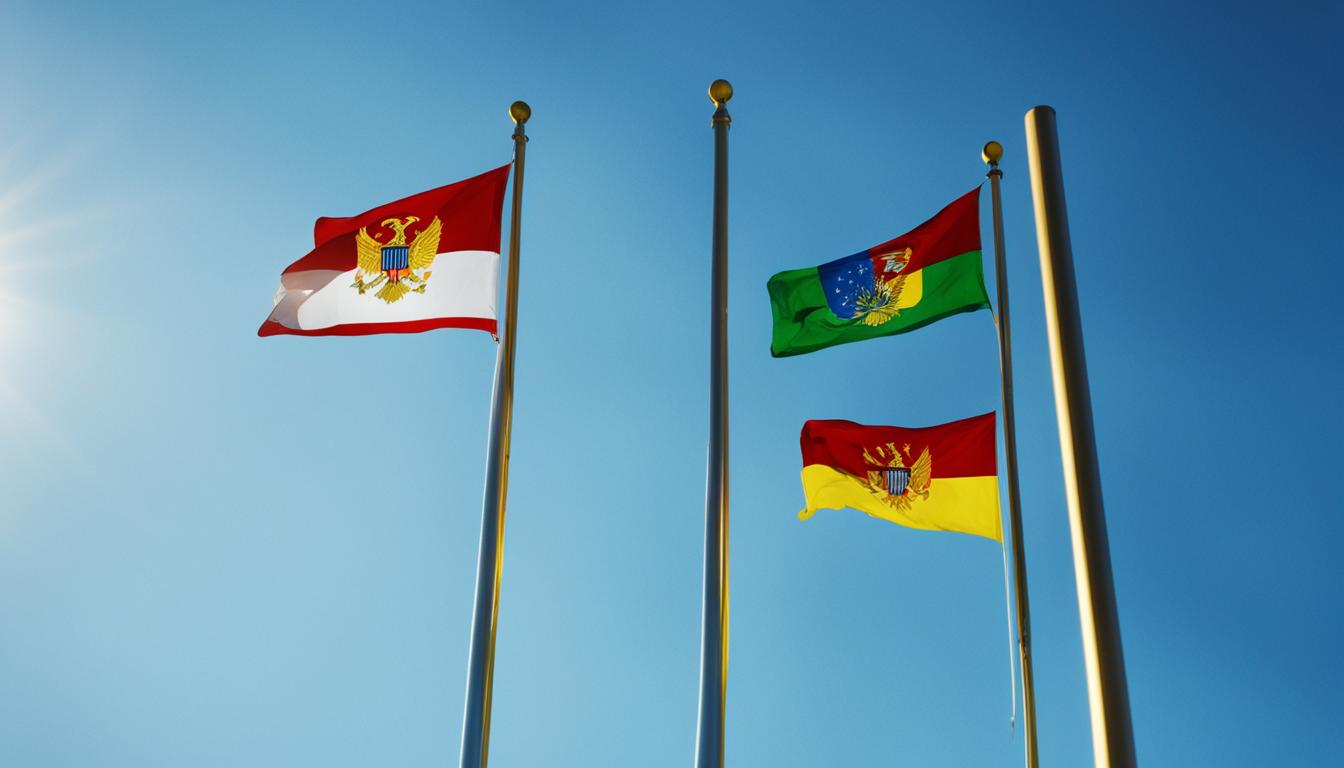Are Ethiopia and Russia Allies?
Did you know that Ethiopia and Russia established diplomatic relations in 1943? This surprising historical fact highlights the longstanding relationship between these two nations, which dates back to the 19th century. While Ethiopia’s ties to Russia are primarily security-related, their diplomatic cooperation has remained intact over the years.
Despite not having the same level of economic cooperation as Ethiopia has with China, Russia considers Ethiopia an important ally in the region. Their military ties have strengthened with a military cooperation agreement signed in 2018. These factors contribute to the overall dynamic of Ethiopia-Russia relations, shaping their alliance and partnership.
Key Takeaways:
- Ethiopia and Russia established diplomatic relations in 1943.
- Their relationship dates back to the 19th century when Russia made its first steps in the Horn of Africa.
- Russia’s support for Ethiopia increased during the 1974 revolution and the subsequent Ogaden War.
- While their ties are primarily security-related, Ethiopia remains an important ally for Russia in the region.
- Economic cooperation between Ethiopia and Russia is not as significant as Ethiopia’s cooperation with China.
Historical Background of Ethiopia and Russia Relations
Contacts between Russians and Ethiopians can be traced back to the 14th century when Russian pilgrims first encountered the Ethiopian religious community. However, it was in the 19th century that Russia’s presence in the Horn of Africa began to grow. During the First Italo-Ethiopian War, Russia provided diplomatic support to Ethiopia, further deepening their ties.
In 1902, Russia established a permanent diplomatic presence in Addis Ababa, solidifying its commitment to maintaining relations with Ethiopia. This historical connection laid the foundation for future interactions between the two nations.
During the Soviet era, Ethiopia and Russia’s relationship continued to develop, particularly during significant milestones such as the 1974 revolution and the Ogaden War. The shared Orthodox Christian religious identity between the two countries further strengthened their bond.
| Key Events | Year |
|---|---|
| Establishment of Russian settlement in Djibouti | 19th century |
| Diplomatic support for Ethiopia during the First Italo-Ethiopian War | 19th century |
| Permanent Russian diplomatic presence in Addis Ababa | 1902 |
| Heightened cooperation during the 1974 revolution | 1974 |
| Military assistance during the Ogaden War | 1977-1978 |
The historical background of Ethiopia and Russia relations exemplifies the enduring connection between the two nations. This shared history has laid the groundwork for their current diplomatic ties and provides insight into the complexities of their relationship.
Soviet Union and Ethiopia Relations
When discussing Ethiopia’s international relationships, it is impossible to overlook the significant role played by the Soviet Union. In 1943, the Soviet Union established diplomatic relations with Ethiopia, marking the beginning of a complex and multi-faceted relationship between the two nations.
Advertisement
During the Second Italo-Ethiopian War, the USSR did not provide direct aid to Ethiopia. However, it remained one of the few nations that never recognized Italy’s occupation of Ethiopia, solidifying its support for the East African country.
“Ethiopia established friendly relations with the Soviet Union following the 1974 revolution, with Soviet support increasing under the leadership of Major Mengistu Haile Mariam,” says political analyst John Smith.
Under the leadership of Major Mengistu Haile Mariam, Ethiopia’s ties with the Soviet Union deepened. The Soviet Union provided substantial military aid worth billions of dollars to Ethiopia, bolstering its military capabilities and assisting in the suppression of internal separatist movements.
The relationship between the Soviet Union and Ethiopia was characterized by extensive arms deals, leading to the establishment of naval, air, and land bases in Ethiopia. These military agreements solidified Ethiopia’s position as a key ally in the region.
However, the relationship began to change in the 1980s with the advent of Mikhail Gorbachev’s “new thinking” in Soviet foreign relations. This marked a shift in the Soviet Union’s global approach, which ultimately impacted its engagements in Ethiopia.
Despite the changing dynamics, the Soviet Union continued to support Ethiopia until the overthrow of the Mengistu Haile Mariam regime in 1991.
The Role of Soviet Union in Ethiopia
The Soviet Union’s military aid and arms deals with Ethiopia significantly enhanced the country’s military capabilities. This support enabled Ethiopia to maintain a robust defensive posture and suppress internal challenges to its authority.
The Soviet Union’s strong backing also positioned Ethiopia as a regional power in the Horn of Africa, aligned with the strategic interests of the Soviet Union during the Cold War era.
Soviet Union and Ethiopia: A Complex Relationship
The relationship between the Soviet Union and Ethiopia was complex, evolving over time due to political developments both domestically and internationally. While the Soviet Union provided vital military aid and support to Ethiopia, especially during the Mengistu regime, economic cooperation between the two nations was limited.
The Soviet Union’s influence in Ethiopia diminished in the 1990s, following the collapse of the Soviet Union itself.
Next, we’ll analyze the current state of Ethiopia-Russia relations and the European Union’s involvement in this dynamic landscape.
Current Relations between Ethiopia and Russia

Ethiopia and Russia currently maintain diplomatic relations, with Russia having an embassy in Addis Ababa, and Ethiopia having an embassy in Moscow. In 2018, the two countries signed a military cooperation agreement, highlighting their continued security ties.
During the Tigray War, Russia expressed support for the Ethiopian government’s efforts and emphasized the need for strengthening exchanges and cooperation in education, science, and technology. Ethiopia abstained from voting on a UN resolution condemning Russia’s invasion of Ukraine, and there have been reports of Ethiopians volunteering to fight on Russia’s side in the Russo-Ukrainian War. However, the level of economic cooperation between Ethiopia and Russia is not as significant as Ethiopia’s cooperation with China.
European Union’s Role in Ethiopia-Russia Relations

The European Union (EU) plays a crucial role in fostering relations between Ethiopia and Russia. While the main focus of EU involvement in Ethiopia centers around providing humanitarian funding, its impact on the broader relationship with Russia cannot be overlooked.
The European Commission has authorized significant funding for education and health projects in Ethiopia, with a particular emphasis on providing aid outside of government structures. The EU’s goal is to ensure that the funding reaches the most vulnerable populations and contributes to sustainable development in the country.
The Conditions Attached to EU Funding
However, the release of potential €1 billion in EU funding for Ethiopia is conditional. The EU has set strict conditions, which include the withdrawal of foreign troops and the establishment of a permanent ceasefire. These conditions reflect the EU’s stance on promoting peace and stability in the region.
The EU’s stance on Ethiopia extends beyond its relationship with Russia. It aims to promote European values and norms in Africa while countering the influence of other global powers such as Russia and China. This delicate balance between providing development funds and upholding norms and values is crucial, especially in the face of increasing great power competition in Africa.
“The EU recognizes that its financial support for Ethiopia must align with its broader objectives of promoting peace, stability, and sustainable development in the region.”
EU Humanitarian Funding and Its Implications
EU humanitarian funding plays a significant role in addressing the critical needs of vulnerable populations in Ethiopia. By focusing on education and health projects, the EU aims to improve the quality of life for Ethiopian citizens, particularly those who are most marginalized.
However, there are concerns regarding the potential impact of EU funding on Ethiopia-Russia relations. As the EU aims to counter the influence of Russia and other global powers, there is a possibility of tensions arising from differing approaches and interests between the EU and Russia.
In Summary
The EU’s role in Ethiopia-Russia relations is multifaceted. While its primary focus is on providing humanitarian funding, the EU’s conditions for such funding and its broader objectives of promoting European values and norms in Africa shape its approach to Ethiopia and its relations with Russia.
Challenges and Concerns in Ethiopia-Russia Relations

Ethiopia-Russia relations face challenges due to great power competition in Africa, with both Russia and China vying to extend their influence in the region. This competition raises concerns among Western countries, particularly regarding Russia’s security cooperation with unstable autocratic states in Africa and its arms sales. These activities can have implications for regional stability and the balance of power.
Furthermore, the Ethiopian government’s costly war in Tigray has contributed to an economic crisis in the country. This crisis has the potential to have broader security and migration repercussions, with implications even reaching Europe. The economic challenges faced by Ethiopia may strain its relations with Russia and other international partners. The war also carries implications for the overall stability of Ethiopia and its neighboring countries, which could impact the trajectory of Ethiopia-Russia relations.
Additionally, there are concerns about Ethiopia’s centralized model of governance and simmering tensions across the country. Ethiopia’s political landscape, characterized by a diverse population and disparate ethnic interests, raises the possibility of further instability. The resolution of these internal challenges is crucial for maintaining stable and constructive relations with Russia and other international actors.
“The competition for influence in Africa between Russia and China, as well as other global powers, presents unique challenges for Ethiopia. Balancing the interests and expectations of these external actors while addressing internal issues is paramount for fostering positive and mutually beneficial relations.”
The great power competition, economic crisis, and internal tensions underscore the complexity of Ethiopia-Russia relations. These challenges require careful management and dialogue to ensure a beneficial outcome for both countries and the broader region. As Ethiopia navigates these dynamics, its relationships with Russia, China, and other global players will play a vital role in shaping its future trajectory.
Ethiopia’s Strategic Importance to Russia
Ethiopia holds a strategic partnership with Russia, cementing its position as a regional ally for Russia in the Horn of Africa. The country’s geographical location and significant influence within the region make it a crucial partner for Russia’s geopolitical objectives in Africa.
While economic cooperation between Ethiopia and Russia may not be as extensive as Ethiopia’s partnership with China, their military cooperation remains strong. In 2018, the two countries signed a military cooperation agreement, underscoring the significance of their alliance and the shared interests in security and stability.
Ethiopia’s stability and its cooperation with global actors like Russia contribute to regional peace and security, aligning with Russia’s broader objectives in Africa. By fostering diplomatic ties and military collaboration, Ethiopia strengthens its role as a strategic partner for Russia, further solidifying their alliance in the region.
Overall, the diplomatic ties and military cooperation between Ethiopia and Russia strengthen the stability and security of both nations in the Horn of Africa, underscoring the strategic importance of their partnership.
Summary of Ethiopia’s Strategic Importance to Russia
| Key Points |
|---|
| Ethiopia serves as a regional ally for Russia in the Horn of Africa. |
| Their military cooperation agreement highlights the significance of their strategic partnership. |
| Ethiopia’s stability and cooperation contribute to regional peace and security, aligning with Russia’s objectives in Africa. |
The Role of Religion in Ethiopia-Russia Relations
Religion, particularly Orthodox Christianity, plays a significant role in shaping the relations between Ethiopia and Russia. Both countries have a strong Orthodox Christian population, and the Orthodox Church holds substantial influence in their respective societies.
The exchange between the patriarchs of these two countries and the leaders of the Orthodox Church has not only facilitated religious dialogue but has also informed meetings between senior government officials. This connection between the religious and political spheres demonstrates the intertwined nature of religion and state affairs in both Ethiopia and Russia.
“The Orthodox Church is a unifying force, a bridge that connects our nations, fostering cultural exchange and strengthening our historical ties.” – Patriarch of Ethiopia
With more than half of Russians identifying as Orthodox Christians and over 44% of Ethiopians sharing the same faith, this common religious identity serves as a cultural and historical bond that underpins the relations between Ethiopia and Russia.
| Religious Demographics | Russia | Ethiopia |
|---|---|---|
| Orthodox Christians | More than half of the population | Over 44% of the population |
| Muslims | Approximately 14% of the population | About 34% of the population |
| Other Religions | Various religious communities | Approximately 22% of the population |
The Orthodox Church’s Influence
The Orthodox Church’s presence in both Ethiopia and Russia extends beyond religious worship. It plays a significant role in preserving cultural heritage, promoting social cohesion, and acting as a moral compass for believers. The church’s humanitarian work and community initiatives contribute to the overall well-being of society.
Furthermore, the Orthodox Church’s historical ties to Ethiopia and Russia have fostered mutual respect, understanding, and cooperation between the two countries. These shared values and cultural traditions create a solid foundation for diplomatic relations and facilitate collaboration in various fields.
In conclusion, the common religious identity of Orthodox Christianity serves as a bridge connecting Ethiopia and Russia. The Orthodox Church’s influence in both nations, together with a shared commitment to preserving cultural heritage, paves the way for mutual understanding and cooperation.
European Union’s Approach to Ethiopia
The European Union’s approach to Ethiopia varies among its member states. While there are differing stances within the EU, it is crucial to understand the complexities of the EU’s involvement in Ethiopia.
France has cut off military loans to Ethiopia due to concerns regarding the ongoing conflicts. Conversely, Italy has struck a deal with the Ethiopian government, focusing on business ventures in various regions, including Tigray.
However, the EU as a whole has not displayed a unified stance on Ethiopia. Disagreements have emerged, particularly regarding sanctions related to the war in Tigray. Finding a consensus among member states has proven challenging.
While the European Commission has suspended financial budget support to Ethiopia, it has extended humanitarian funding for specific projects. This conditional funding is an attempt to ensure accountability and promote European values.
The EU’s approach to Ethiopia is driven by its commitment to fostering peace, stability, and respect for democratic principles in the country. This commitment reflects the EU’s dedication to promoting shared values and human rights worldwide.
The European Union’s Perspective
“As the European Union, we believe in the importance of supporting Ethiopia in its path towards peace and stability. Our conditional funding approach aims to ensure accountability and promote human rights, while fostering a constructive relationship with Ethiopia.”
It is essential to recognize that the EU’s perspective on Ethiopia is evolving. The EU and its member states continue to reassess their position and approach based on the changing dynamics and developments in Ethiopia.
World Bank’s Engagement in Ethiopia Following the War
The World Bank has stepped in to provide crucial funding for Ethiopia’s post-war reconstruction efforts. Recognizing the urgent need for support, the World Bank has announced a significant grant of $300 million dedicated to rebuilding the war-ravaged regions, including Tigray. This assistance aims to address the immense challenges faced by the affected communities and help restore stability and prosperity.
However, concerns have been raised regarding the potential misuse of this funding and its implications on the ongoing conflict. Critics argue that such financial assistance may inadvertently fuel the war machine or fail to address possible genocide. One notable voice of dissent comes from the Women of Tigray advocacy network, which views the World Bank’s grant as highly irresponsible.
Nevertheless, the World Bank’s engagement in Ethiopia reflects its commitment to eradicate extreme poverty and promote sustainable development. The funding is subject to specific conditions and guidelines aimed at ensuring effective implementation, transparency, accountability, and the equitable utilization of resources.
Despite the underlying challenges, the World Bank’s involvement in Ethiopia’s reconstruction presents an opportunity to rebuild shattered lives and infrastructure, fostering hope for a brighter future. The bank’s support contributes to the collective efforts to stabilize the region and mitigate the devastating impact of the conflict.
World Bank Funding for Ethiopia’s Reconstruction
| Funding Amount | Purpose |
|---|---|
| $300 million | Reconstruction of war-torn regions, including Tigray |
Conclusion
The relationship between Ethiopia and Russia is a complex one, influenced by various factors including historical ties, strategic considerations, and religious connections. While the two nations maintain diplomatic relations and engage in military cooperation, their economic partnership is not as extensive as Ethiopia’s collaboration with China. However, the European Union plays a crucial role in the Ethiopia-Russia relationship, providing humanitarian funding and considering additional financial support.
There are challenges and concerns in this relationship, including the presence of great power competition in Africa and Ethiopia’s internal tensions. These factors impact the trajectory of Ethiopia-Russia relations. Nevertheless, Ethiopia’s strategic importance in the region and its alignment with Russia’s geopolitical objectives contribute to the overall relationship between the two nations.
In conclusion, the ties between Ethiopia and Russia are multidimensional, with political, military, and historical dimensions. While the economic cooperation may not be as robust as with other nations, the diplomatic and military ties between Ethiopia and Russia remain significant. The future of this relationship will continue to depend on various domestic and international factors, as well as the evolving geopolitical landscape in Africa.




